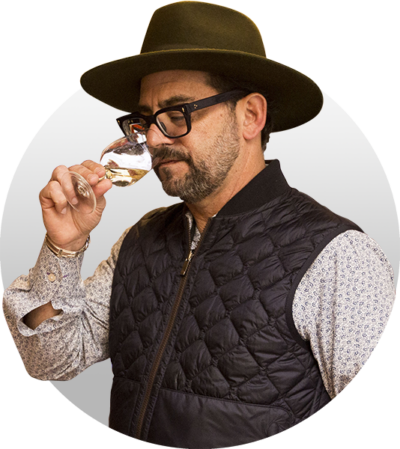About De Maison Selections
De Maison Selections is the exclusive US importer of exceptional wines, ciders, sherries and spirits from our family of independent producers in Spain and France. De Maison Selections was founded by André Tamers in 1996 upon his return from a three-year journey throughout Spain. The company was named in honor of his mother, whose family roots go back to Haute-Savoie in France. Her father had three daughters and the name De Maison was destined to disappear, which inspired the name of the company and resulted in the continuity of the De Maison family name.
Responsibly Sourced Wines, Ciders and Spirits
Our commitment to ecological values and leadership…
is a reflection of our deep and binding respect for our community of producers, clients, and our own families. Our agricultural philosophy is rooted in a systems ecology approach, encompassing not only the health of the vineyard and its produce but also the health and prosperity of each community of growers and their surroundings. This includes the financial prosperity of the people from each village, affording the progressive farming ideals which require more than rhetoric to maintain. Our philosophy is based on adaptive generational change and improvements to the functionality of these systems in order to address the heart of the issue, which is often economic. Fair and consistent economic partnership over decades is the fuel that stokes the fires of responsible agriculture.
Continously Seeking Excellence in Our Craft
Del most flor, amb la dedicació i el rigor de l’obra artesanal ben feta. This Catalan saying graces the label of the first wine we imported, Avinyó Cava, and translates as “starting with the best part of the harvest, and exerting the dedication and rigor of a well-crafted work.” It is an idea which has guided our company philosophy since 1996. This concept of respecting the integrity of the source material with dedicated care drives us in our quest to work thoughtfully, share authentic culinary and cultural experiences, and leave things better than we found them.
Guaranteed Provenance
Guaranteeing the provenance and integrity of our shipments…
is paramount to the authenticity of terroir and respect of vignerons and their goods. All of our other efforts would be lost without our unwavering commitment to the concepts of provenance and traceability. Progress begins with awareness, and as our collective awareness of the proper standards for storage and transportation grows, the question consumers should pose remains unasked: “how was this bottle shipped?”
How We Work
A Partnership Guide for Producers
De Maison Selections works exclusively with artisan producers from Spain and France who own and control their vineyards and means of production. We work with producers who represent the highest quality of their respective appellations and disciplines, producers who do not conform to any specific dogma other than absolute quality and respect for their environment, community, and consumers.
We do not work with bulk cooperatives, negociants, brokers, or middle-persons. We offer something very rare in the US market: direct market access and the expertise of our dedicated team. We work exclusively with our suppliers in all 50 US states and Puerto Rico. We do not split market share with other US importers. This arrangement means we offer suppliers one convenient and easily accessible interface to the US market through De Maison Selections.
Cómo Trabajamos
Una Guía de Colaboración para Productores
De Maison Selections trabaja exclusivamente con productores artesanales de España y Francia que poseen y controlan sus viñedos y medios de producción. Trabajamos con productores que representan la calidad más alta de sus respectivas denominaciones y disciplinas, productores que no se ajustan a ningún dogma específico, que no sea la calidad absoluta y el respeto por su entorno, comunidad y consumidores.
No trabajamos con cooperativas a granel, negociantes, brokers o intermediarios. Ofrecemos algo muy raro en el mercado estadounidense: acceso directo al mercado y la experiencia de nuestro equipo dedicado. Trabajamos exclusivamente con nuestros proveedores en los 50 estados de EE. UU. y Puerto Rico. No dividimos la participación de mercado con otros importadores estadounidenses. Esto significa que ofrecemos a los proveedores una interfaz conveniente y de fácil acceso para el mercado estadounidense a través de De Maison Selections.
Comment Nous Travaillons
Un Guide de Partenariat Pour les Producteurs
De Maison Sélections travaille exclusivement avec des producteurs artisanaux d’Espagne et de France qui possèdent et contrôlent leurs vignobles et leurs moyens de production. Nous travaillons avec des producteurs qui représentent la plus haute qualité de leurs appellations et de leurs disciplines respectives, des producteurs qui ne se conforment à aucun dogme spécifique, autre que la qualité absolue et le respect de leur environnement, de leur communauté et des consommateurs.
Nous ne travaillons pas avec les coopératives de vin en vrac, les négociants, les courtiers ou les intermédiaires. Nous proposons quelque chose de très rare sur le marché américain: un accès direct au marché et l’expertise de notre équipe dévouée. Nous travaillons exclusivement avec nos fournisseurs dans les 50 États américains et à Porto Rico. Nous ne partageons pas la part du marché avec d’autres importateurs américains. Cela signifie que nous offrons aux fournisseurs une interface pratique et facilement accessible au marché américain via De Maison Sélections.
Press Inquiries
Please send all press inquiries to press@demaisonselections.com in order to assure prompt and proper responses.
Travel Inquiries
If you are interested in visiting our winery & distillery partners, please fill out our inquiry form in order to be considered. In some cases, you may also be able to plan a visit directly through our producers.
















Comment nous travaillons
Un Guide de Partenariat Pour les Producteurs
De Maison Sélections travaille exclusivement avec des producteurs artisanaux d’Espagne et de France qui possèdent et contrôlent leurs vignobles et leurs moyens de production. Nous travaillons avec des producteurs qui représentent la plus haute qualité de leurs appellations et de leurs disciplines respectives, des producteurs qui ne se conforment à aucun dogme spécifique, autre que la qualité absolue et le respect de leur environnement, de leur communauté et des consommateurs.
Nous ne travaillons pas avec les coopératives de vin en vrac, les négociants, les courtiers ou les intermédiaires. Nous proposons quelque chose de très rare sur le marché américain: un accès direct au marché et l’expertise de notre équipe dévouée. Nous travaillons exclusivement avec nos fournisseurs dans les 50 États américains et à Porto Rico. Nous ne partageons pas la part du marché avec d’autres importateurs américains. Cela signifie que nous offrons aux fournisseurs une interface pratique et facilement accessible au marché américain via De Maison Sélections.
Nous contrôlons tous les systèmes en interne et offrons les services suivants à nos fournisseurs:
Nous sommes importateurs nationaux américains depuis 1996 et nous restons une entreprise futuriste, axée sur l’établissement de bonnes relations à long terme, mutuellement avantageuses, grâce à la promotion d’idées progressistes et émergentes. Nous avons une vision à long terme pour tous nos projets, car nous comprenons que de véritables relations et progrès durables sur le marché américain sont progressifs et nécessitent un partenariat clé au sein de notre communauté de distributeurs dans chaque territoire américain. Nous souhaitons créer des campagnes de marketing authentiques et locales qui obtiennent des résultats grâce à une narration claire et à la transmission du message culturel et social unique de chaque producteur. Nous abordons chaque projet individuellement, avec soin et respect pour chaque producteur.
Nous proposons à nos clients des produits de provenance contrôlée, en accordant une attention particulière au transport et au stockage corrects de notre portefeuille. Vous pouvez en savoir plus sur notre partenariat de pointe avec VinAssure et IBM ici. Nous sommes l’un des très rares importateurs américains à exiger et à authentifier l’expédition et le stockage réfrigérés de leurs produits.
Vous pouvez en savoir plus sur De Maison Sélections via ce site Web, notre Instagram et notre chaîne YouTube.